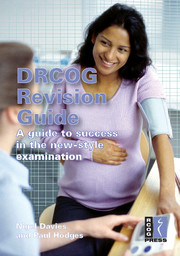Book contents
- Frontmatter
- Contents
- Foreword
- About the authors
- Acknowledgements
- Abbreviations
- 1 Introduction
- 2 The curriculum
- 3 Syllabus
- 4 The new DRCOG examination
- 5 Extended matching questions
- 6 EMQ paper one
- 7 EMQ paper two
- 8 Single best answer (best of five) questions
- 9 Single best answer paper one
- 10 Single best answer paper two
- 11 Multiple choice questions
- 12 MCQ paper one
- 13 MCQ paper two
- 14 Ten tips for candidates
- 15 Answers
- Mock examinations answer sheets (blank)
- Index
2 - The curriculum
Published online by Cambridge University Press: 05 August 2014
- Frontmatter
- Contents
- Foreword
- About the authors
- Acknowledgements
- Abbreviations
- 1 Introduction
- 2 The curriculum
- 3 Syllabus
- 4 The new DRCOG examination
- 5 Extended matching questions
- 6 EMQ paper one
- 7 EMQ paper two
- 8 Single best answer (best of five) questions
- 9 Single best answer paper one
- 10 Single best answer paper two
- 11 Multiple choice questions
- 12 MCQ paper one
- 13 MCQ paper two
- 14 Ten tips for candidates
- 15 Answers
- Mock examinations answer sheets (blank)
- Index
Summary
The RCOG takes the view that the DRCOG should be a certificate of appropriate knowledge of women's health care as applied to the GP in the UK and this view is reflected in the new DRCOG curriculum and syllabus.
The old-style DRCOG examination was not derived from an explicit curriculum. However, the previous DRCOG syllabus, in use from the early 1990s onwards, was vast and effectively meant that candidates were required to understand all aspects of obstetrics and gynaecology, neonatology, genitourinary medicine and contraception. The new curriculum and syllabus have narrowed those domains of knowledge to those areas of women's health appropriate to a UK-based GP. For example, you are no longer expected to know how to perform a hysterectomy but you would be expected to be able to counsel a woman with regard to the complications associated with a hysterectomy and the relative benefits of choosing other options for the management of menorrhagia.
Candidates applying for the DRCOG examination should note that, with effect from October 2007, the DRCOG examination will be subject to a new curriculum and syllabus. The new DRCOG will measure the candidate's ability to apply knowledge in relation to common and important aspects of women's health, as outlined in the syllabus, and to make appropriate clinical judgements.
- Type
- Chapter
- Information
- DRCOG Revision GuideA Guide to Success in the New-Style Examination, pp. 5 - 26Publisher: Cambridge University PressPrint publication year: 2008



